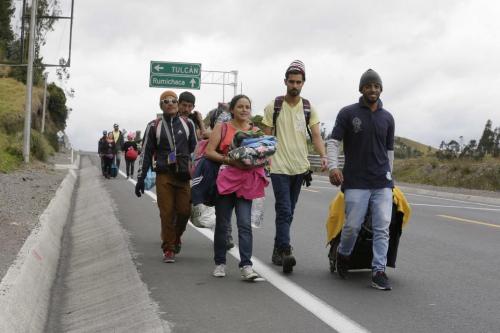Ecuador: Uphold Rights of Fleeing Venezuelans
Human Rights Watch Files Amicus Brief Before Constitutional Court
The Constitutional Court of Ecuador should uphold the rights of Venezuelans who have fled to Ecuador, Human Rights Watch said in an amicus brief filed before the court on May 08, 2019. The court is scheduled to hold a hearing on a case addressing this issue on May 22, 2019.

The Constitutional Court of Ecuador should uphold the rights of Venezuelans who have fled to Ecuador, Human Rights Watch said in an amicus brief filed before the court on May 08, 2019. The court is scheduled to hold a hearing on a case addressing this issue on May 22, 2019.
On March 11, the Ecuadorean Ombudsman Office, together with representatives from various Ecuadorean organizations, asked the Constitutional Court to declare that the requirements the Ecuadorean government has imposed on Venezuelans to allow them to stay in Ecuador are unconstitutional. A panel of three justices on March 27 adopted precautionary measures suspending the requirements while the case is under consideration.
“The political, economic, human rights, and humanitarian crisis in Venezuela creates a mix of factors that cause Venezuelans to leave the country and makes them unable or unwilling to return,” José Miguel Vivanco, Americas director at Human Rights Watch, said in the brief. “Some of these factors alone may qualify a person for refugee status, while for some others the cumulative impact of various factors could give rise to a valid claim for refugee status.”
In other cases, individuals fleeing Venezuela may not be able to claim refugee status but would face severe hardship if returned to Venezuela and are in urgent need of humanitarian assistance in the countries to which they have migrated, Human Rights Watch said.
Venezuela’s health system has collapsed, with increased levels of maternal and infant mortality; the spread of vaccine-preventable diseases, such as measles and diphtheria; and increases in numbers of people with infectious diseases such as malaria and tuberculosis (TB). Although Venezuelan authorities stopped publishing official data on nutrition in 2007, research by Venezuelan organizations and universities documents high levels of food insecurity and child malnutrition, and available data shows high hospital admissions of malnourished children.
According to the joint special representative of the Office of the United Nations High Commissioner for Refugees (UNHCR) and the International Organization for Migration (IOM) for Venezuelan refugees and migrants, more than 3.7 million Venezuelans have fled their country. An estimated 250,000 Venezuelans have arrived in Ecuador. The UN Office of the High Commissioner for Refugees has reported that, as of December 2018, more than 13,000 Venezuelans had sought asylum and 99,000 had other types of regular status in Ecuador.
In August, Ecuadorean authorities announced that they would require Venezuelans to present a passport to enter the country. The Ecuadorean government withdrew the measure after a judge ruled against it and replaced it with a requirement for Venezuelans unable to present passports to instead present valid certification of their Venezuelan identity cards issued by an international or regional authority recognized by Ecuador, or by competent Venezuelan authorities.
In January, Ecuadorean authorities began to require all Venezuelans entering Ecuador to present their criminal records from their country of origin or countries where they had lived for the past five years before entering Ecuador. In February, this was modified by a resolution that exempted children, people with Ecuadorean family, people with resident status in Ecuador, and people in transit to another country.
Governments that have measures requiring Venezuelans seeking certain kinds of lawful immigration status to present valid passports should ensure that such measures do not prevent Venezuelans who lack those documents from applying for refugee status or penalize them for unauthorized entry or stay, Human Rights Watch said. In general, and in light of the difficulties many Venezuelans face in obtaining passports, governments should consider other reasonable and flexible means of verifying the identities and nationalities of Venezuelans seeking entry.
Source:Human Rights Watch
- 430 reads
Human Rights
Fostering a More Humane World: The 28th Eurasian Economic Summi

Conscience, Hope, and Action: Keys to Global Peace and Sustainability

Ringing FOWPAL’s Peace Bell for the World:Nobel Peace Prize Laureates’ Visions and Actions

Protecting the World’s Cultural Diversity for a Sustainable Future

Puppet Show I International Friendship Day 2020

